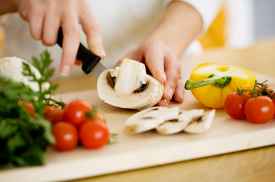Raw or Cooked Vegetables: Which is Best for Weight Loss?

Eating plenty of vegetables is one of the best ways to ensure a steady, easy weight loss.
Most vegetables are low in calories, and packed with fiber and nutrients, helping immensely in burning fat and shedding pounds.
But does it matter if you cook the vegetables? Or should you eat them raw most of the time?
What are the Differences Between Raw and Cooked Vegetables
There can be a caloric difference between raw and cooked foods. Raw vegetables tend to have less calories than cooked vegetables
One reason for this is that raw foods contain more water, and cooking them evaporates the water so the remaining food is more dense in calories.
An extreme case of a calorie difference between raw and cooked vegetables is spinach.
One cup of raw spinch has 7 calories but 1 cup of cooked spinach has about 41 calories
Even at 41 calories per cup, cooked spinach isn’t going to hurt you when it comes to creating a calorie deficit for weight loss.
But for the most part, the calorie difference between raw and cooked vegetables is not a great one.
Another difference is that cooked food is more easily digested and the body can utilize more of the energy from the food with less work.
Do Cooked Vegetables Lose Their Nutritional Value?
While experts say raw foods retain more of their nutrients, and cooking depletes nutrients, most experts insist that foods don’t lose THAT much nutrition just from cooking.
Some vitamins are depleted from food when cooking it, but not enough to make the food valueless.
In fact, some foods become more nutritious when cooked, like tomatoes, carrots, asparagus and yams.
Now, you could get into the nitty gritty of whether a particular vegetable should be eaten raw or cooked to get the most out of its nutrients.
For example, studies say beets are more nutritious when eaten raw. But, if you love eating them cooked, it doesn’t make sense for you to stop eating cooked beets because raw beets are more nutritious.
If you worry too much about the nutritional value in raw vs. cooked veggies, you run the risk of eating fewer vegetables.
And that would defeat the purpose of eating more vegetables to help you eat healthier and lose weight.
See: How to Add More Vegetables to Your Diet to Help You Lose Weight
Should I Eat Fresh, Frozen or Canned Vegetables?
What about eating your vegetables fresh, frozen, or from a can. Is one better than the others?
You would think fresh vegetables are more nutritious than canned or frozen vegetables, but that’s not necessarily true.
Once vegetables are picked, if they aren’t used right away they steadily lose nutrient value. If vegetables are picked and frozen or canned within hours, they can retain almost all of their nutrient value.
The problem here is that most of us don’t grow our own vegetables. We buy them from the produce section of our local supermarket, but have no idea how long they’ve been sitting there after being picked and shipped.
When it comes right down to it, it doesn’t really matter that much. A cucumber that was picked 8 days ago will still be almost as nutritious as one picked 2 days ago.
See: Top 5 Healthy Dark Green Vegetables
The Solution: Eat a Mixture of Cooked and Raw Vegetables
Ideally, it’s best to eat a mixture of raw and cooked vegetables, and lean more toward fresh vegetables when possible. But you can still supplement your diet with frozen or canned vegetables (no added salt or sugar) when necessary.
Steam, boil, roast or lightly saute your vegetables when you do eat cooked vegetables instead of raw.
Bonus tip: During the summer months when fresh, delicious vegetables are available at farmer’s markets, why not buy as many as you can, and then blanch and freeze them yourself? That way you have the freshest, most nutritious vegetables on hand all year long.
Load up on vegetables whether they’re raw or cooked. They pack a nutritional punch with few calories. And that’s exactly what you need when you’re trying to lose weight.
Related Tools
Calorie Count of Vegetables
Calorie Count of Fruits
Top 7 Healthy Orange Fruits and Vegetables
How to Get More Veggies Into Your Diet
Eat Healthy: Add Butternut Squash to Your Diet
